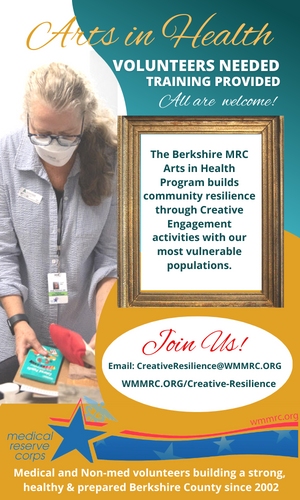The MRC Senior Citizen Resilience Program was featured in FEB 2022 Issue of the ‘In Touch’ national MRC newsletter! READ IT HERE
Background: COVID disproportionately targets seniors. Not only are seniors more vulnerable to the physical effects of the pandemic, the mental and emotional challenges they may experience due to new levels of isolation and loneliness are unparalleled. Isolation and loneliness are recognized as public health issues associated with the worst health outcomes: isolation is associated with increased risk of dementia, heart disease and stroke; loneliness causes higher rates of depression, anxiety, and suicide. COVID has intensified this issue to crisis proportions.
Project: The MRC Senior Citizen Resilience Program strives to mitigate these ill effects with creativity and connectedness, both proven to have positive impacts on health and wellbeing.
MRC will develop and train a cadre of volunteers to provide special support for seniors to decrease the physical and mental consequences of isolation that have been exacerbated by the pandemic.
MRC will match each trained volunteer with one senior; the volunteer will guide creative expression-based activities proven to improve quality of life by:
- Diminishing negative health consequences of social isolation and loneliness;
- Building a sense of connectedness with self/others; and
- Providing a link with the outside world.
The project will use a multipronged approach including:
STORYTELLING:
- Volunteers will read uplifting stories of resilience over the phone or computer (similar to our “We Read Stories” program);
- Volunteers will interview their Senior and guide them through telling and recording their own personal stories of resilience. Having one’s story “heard” helps people feel empowered and they may gain a greater sense of self-esteem and connectedness to life experiences.
FILM:
- Utilizing a selection of films curated by the Foundation for Art and Healing’s signature The UnLonely Program, the Volunteer and Senior will select and watch short films (together or on their own) and discuss. Seniors may also be prompted to write about the film.
CULTURE:
- The Volunteer will teach their Senior (if s/he is able to access the internet) how to find and participate in free virtual tours, concerts, galleries, educational talks, and performances made available by cultural organizations. HERE is a list we’ve compiled to use when accessing events!
It’s good for our volunteers, too! Senior Citizen Resilience Team Volunteers will simultaneously experience enhanced personal resilience through volunteerism and creativity – both activities proven to benefit one’s health!
Timeline: Since early November 2020, the MRC coordinators have identified and contacted potential partners for this project; that work continues as we search for organizations that can identify seniors who may be interested in participating.
We are simultaneously contacting people who can present trainings or connect us with arts opportunities. We’re also devising new trainings and researching best practices for various elements of the project.
We hope to offer trainings for those volunteers interested in guiding the storytelling process by interviewing seniors to share their stories and for those who want to participate in the Film portion of the initiative utilizing The Unlonely Program’s curated selection of short movies and discussion prompts.
To help us launch the program, we invited Amy Poueymirou, Program Director for the Foundation for Art and Healing and “The Unlonely Program” to speak about the Public Health implications of isolation and loneliness and how creativity is proven to help.
HERE IS THE REPLAY OF THAT WEBINAR
Volunteers who wish to participate in this program should contact Corinne at cmckeown@wmmrc.org and let her know which approach interests you. Volunteers are also encouraged to think about who they know to be a match for the program – either as a new volunteer or a senior beneficiary. Note: only volunteers who have completed their application/ background check and basic training may apply. (If you are not sure, let us help you get there!)
This program made possible by COVID Resiliency Grants through the Massachusetts Service Alliance and NACCHO


